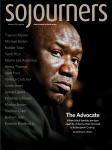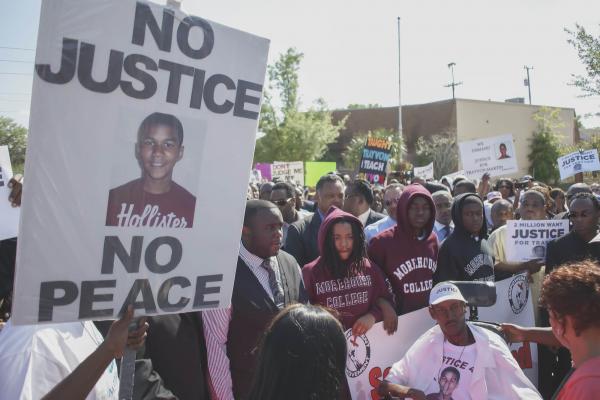SEVEN YEARS AGO this month, Trayvon Martin, an unarmed 17-year-old high school student, was shot and killed while visiting relatives in Sanford, Fla. After George Zimmerman’s 2013 acquittal for Trayvon’s murder, I wrote about what it meant to me, particularly as a father.
I wrote about the fundamental injustice of a system and a nation in which a teenage boy like Trayvon could be killed as a direct result of being racially profiled, and his killer not held accountable, while my own teenage boys would never need to fear that a stranger would target them due to their race:
If my white 14-year-old son, Luke, had walked out that same night, in that same neighborhood, just to get a snack, he would have come back unharmed—and he would still be with me and Joy today. But when black 17-year-old Trayvon Martin went out that night, just to get a snack, he ended up dead—and is no longer with his dad and mom. Try to imagine how that feels, as his parents.
Martin Luther King Jr. said in his “I Have a Dream” speech, “I have a dream that my four little children will one day live in a nation where they will not be judged by the color of their skin, but by the content of their character.” King’s dream failed on Feb. 26, 2012, when George Zimmerman decided to follow Trayvon Martin because of the color of his skin. Racial profiling is a sin in the eyes of God. It should also be a crime in the eyes of our society and in the laws we enact to protect each other and our common good.
White parents should ask black parents what they were talking about with their children [that] weekend. It is a long-standing conversation between black dads and moms and their children, especially their boys, about how to carefully behave in the presence of police officers with guns. Now they must add any stranger who might have a gun and could claim they were fearful of a black man and had to shoot. This is one of those painful moments that reveal an utterly segregated society. Most white people, conservatives and liberals, had almost no idea of what was happening in virtually every black family in America.
White Christians cannot and must not leave the sole responsibility of telling the truth about America, how it has failed Trayvon and so many other black Americans, solely to their African-American brothers and sisters in Christ. It’s time for white Christians to listen to their black brothers and sisters, to learn their stories, and to speak out for racial justice and reconciliation. The country needs multiracial communities of faith to show us how to live together.
WHAT DOES THE killing of Trayvon Martin and its aftermath tell us about the United States today?
It is undeniable, on the one hand, that a new generation of civil rights activism and activists have emerged in the years since Trayvon’s killing, most importantly in the Black Lives Matter movement, which arose as a response to the killing of people of color such as Trayvon and Michael Brown. Police violence against people of color has led to a broad conversation on structural racism, particularly in the criminal justice system, that had not been in mainstream political discourse until Black Lives Matter activists put it there, often at great personal risk and sacrifice.
We have seen the work of the movement translate to real reforms in states and localities across the country as recently as the 2018 midterms. Voters approved ballot initiatives such as Amendment 4 in Florida, which restores the voting rights of former felons who have paid their debt to society, and ended non-unanimous jury convictions in Louisiana. Both measures represented direct reversals of policies that had been instituted for clearly racist purposes. We have also seen district attorneys elected on promises of significant reform in places such as Philadelphia, Denver, Chicago, and elsewhere.
Yet as much as the killing of Trayvon and so many others sparked a movement, the breadth and ferocity of white resistance and backlash to forward motion on racial justice has also revealed itself. Donald Trump’s political rise has both harnessed and revealed that “white-lash”; it can best be understood as not the cause but the consequence of our nation’s continued racial illness of white supremacy, which claims so many black and brown lives every year, as it has since before our nation’s founding.
America still has a choice to make. Will we be a racist nation going forward? Is what we are now experiencing white supremacy’s last gasp, its “death knell,” as some people have said? Or is it another double-down against racial justice that we should expect to see over and over in the decades to come?
Honoring the life of Trayvon Martin and so many others whose lives and bodies have been destroyed by white supremacy means making a commitment to never stop fighting for the country to make the right choice.

Got something to say about what you're reading? We value your feedback!





